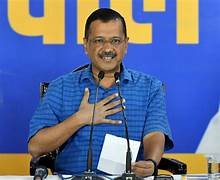In a notable diplomatic incident, India has called upon a German diplomat for remarks concerning the detention of Delhi Chief Minister Arvind Kejriwal. The incident has sparked discussions about diplomatic protocols, freedom of speech, and the handling of sensitive political matters on the international stage.
The controversy erupted when a German diplomat, whose identity has not been disclosed, made remarks concerning the arrest of Arvind Kejriwal, the Chief Minister of Delhi and a prominent figure in Indian politics. Kejriwal’s arrest, stemming from allegations related to a protest, garnered widespread attention within India and abroad, leading to varied reactions and opinions.
The comments made by the German diplomat were perceived by Indian authorities as interference in internal matters and a breach of diplomatic decorum. As a result, the Indian government swiftly summoned the diplomat for a discussion on the matter, highlighting the seriousness with which such statements are viewed in the realm of international relations.
The incident has reignited debates about the boundaries of diplomatic discourse and the extent to which diplomats can express opinions on the domestic affairs of host countries. While diplomatic immunity protects diplomats from legal actions in many cases, it does not exempt them from facing repercussions for statements deemed inappropriate or intrusive by host nations.
Furthermore, the timing of the remarks, coinciding with a politically charged situation involving a prominent Indian leader, added to the sensitivity of the matter. Political developments and controversies often attract international attention, leading to reactions and statements that can strain diplomatic relations if not handled with tact and sensitivity.
The summoning of the German diplomat underscores India’s commitment to upholding diplomatic norms and safeguarding its sovereignty against perceived external interventions. Diplomatic channels serve as essential mechanisms for resolving disputes and fostering mutual understanding between nations, but they also require adherence to established protocols and mutual respect for internal affairs.
On the flip side, the incident has sparked discussions about freedom of speech and the rights of diplomats to express opinions, even on contentious issues. While diplomats are expected to exercise discretion and refrain from statements that could inflame tensions, they also play a role in promoting dialogue and raising awareness about global issues, including human rights and democratic principles.
The situation surrounding Kejriwal’s arrest itself remains a subject of debate within India, with opinions divided on the legality and justification of the actions taken. Kejriwal, known for his activism and vocal stance on various issues, has a significant following and has been involved in several high-profile controversies throughout his political career.
In response to the diplomatic incident, both Indian and German officials have emphasized the importance of maintaining constructive dialogue and addressing differences through diplomatic channels. Efforts to de-escalate tensions and reaffirm commitments to mutual respect and cooperation are underway, highlighting the resilience of diplomatic relations between the two nations.
Moving forward, the incident serves as a reminder of the complexities inherent in international diplomacy and the need for clear communication, mutual understanding, and respect for sovereignty. While disagreements may arise, diplomatic engagements should prioritize dialogue, cooperation, and resolution of differences through peaceful means.
The summoning of a German envoy due to comments on Arvind Kejriwal’s detention highlights the intricate nature of diplomatic engagements and the necessity of honoring each nation’s domestic matters. The incident highlights ongoing discussions about freedom of speech, diplomatic decorum, and the role of diplomats in navigating sensitive political situations on the global stage.




